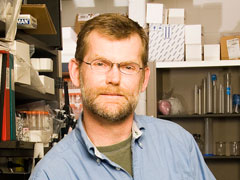MaRS Innovation and Sunnybrook partner to develop four medical discoveries
MaRS Innovation and Sunnybrook Health Sciences Centre have entered into their first set of agreements to collaboratively commercialize a novel therapeutic technology and three advances in medical imaging. These four technologies will impact diagnosis and care for epidemic chronic illnesses and have clear and broad commercial potential. MI will shepherd these opportunities through the next stages of the commercialization process.
"We are coming out of the gate vigorously in identifying this group of Sunnybrook technologies as commercialization opportunities," said Dr. Rafi Hofstein, President and CEO of MaRS Innovation. "MaRS Innovation sits with academic institutions at the hub of a major North American cluster in medical devices and biomedical engineering. This agreement will enable MaRS Innovation to leverage our resources with Sunnybrook's and generate attractive investment packages."
Vasculotide: Speeding Up Recovery of Painful Diabetic Skin Ulcers
Molecular and cellular biologist Dr. Daniel Dumont, Canada Research Chair in Angiogenic and Lymphangiogenic Signalling, and his team have discovered a compound, Vasculotide, that recruits new blood vessels. Given the important mechanism of action, this compound has applications in several clinical indications that represent unmet medical needs. The leading indication for Vasculotide is in wound healing, more specifically treating the chronic ulcers common among many of the world's 300 million diabetics. However, MI will be evaluating all the potential market opportunities for this platform technology to identify the most commercially viable development strategy.
Two Innovations to Improve How We See the Hearts of Our Patients
The imaging invention from electrophysiologist Dr. Eugene Crystal and his team in Sunnybrook's Schulich Heart Centre will enable 3D visualization of internal structures in the patient, resulting in precision placement of a tracking catheter. In combination with traditional fluoroscopic X-ray, the technology overcomes the limitations of 2D images for catheter positioning in such critical surgical procedures as the removal of damaged tissue in cardiac surgery. We are encouraged that this technology, along with two others MI technologies previously announced, has received Proof of Principle funding from the Canadian Institute of Health Research (CIHR).
A second catheter-based technology, invented by imaging scientist Dr. Charles Cunningham, also of the Schulich Heart Centre, enables the marker at the tip of the tracking catheter device to be turned off and on, overcoming an obstacle to MRI-guided vascular procedures: the tendency of the imaging marker to obscure the very area that needs to be seen. Indications for the marker innovation include the treatment of coronary occlusions and peripheral vascular disease.
New Tablet Computer Helps Diagnose Brain Injury
Imaging scientist Dr. Simon J. Graham and his team have invented an MRI-compatible device, or tablet, that will enable scientists and clinicians to pinpoint the origin of actual brain functions at source, in the brain itself, while cognitive tasks are being performed--and thereby confirm or correct what traditional writing-based tests suggest about how the brain worksor how it is affected by trauma. Dr. Graham developed the device while at Sunnybrook and Baycrest.
"Our investigators' innovations represent a next-generation of therapeutics with multiple potential future applications, and novel components in the emerging market for MRI interventions," said Sunnybrook Vice-President of Research Dr. Michael Julius. "We are delighted that our partnership with MaRS Innovation will bring these technologies closer to the marketplace and patients."
"With these technologies, MaRS Innovation has received more than 200 unencumbered disclosures of intellectual property," added Dr. Hofstein. "Moving these through our pipeline, we are squarely focused on completing pre-clinical development to enhance the technologies' investment potential."
PDF / View full media release »







